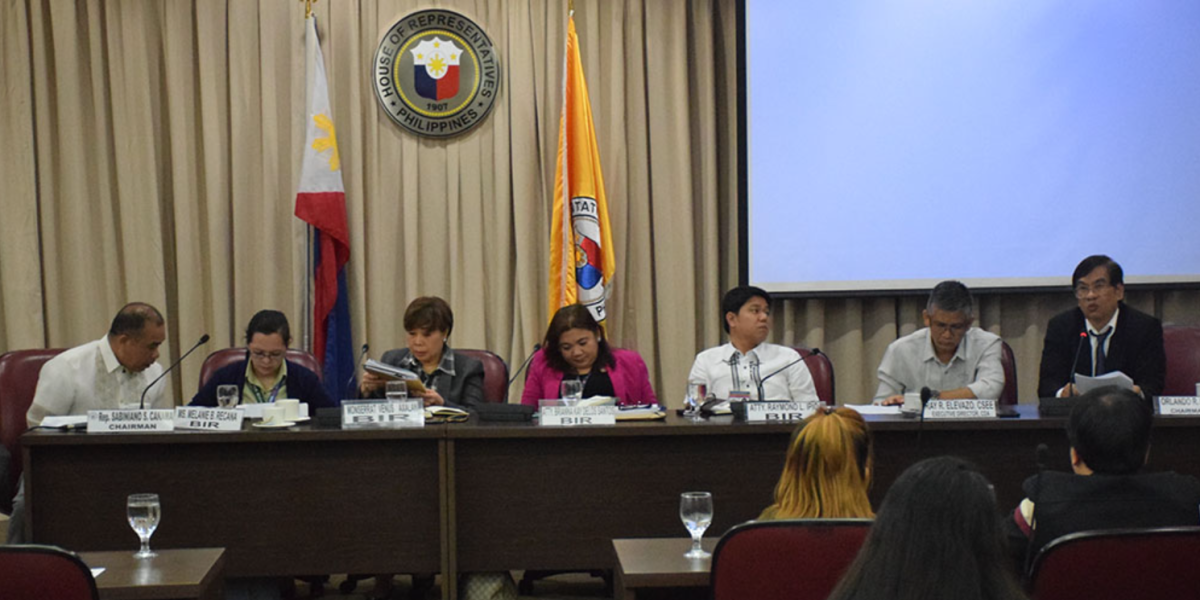Co-ops complain: Penalty for ATIR non-submission ‘too harsh’
QUEZON CITY – “Very few co-ops have availed of the tax exemptions. Why is it that we have exemption in the law but after a decade only 33% of co-ops have availed? Why give co-ops the privilege of exemption when they will be deprived in the end? And not only are co-ops not able to avail, they will even be penalized!”
This was the complaint of Nenita Malbas of Tagum Cooperative before the members of the Technical Working Group at the House of Representatives on March 4, discussing how to ease the difficulties experienced by cooperatives in accomplishing their Annual Tax Incentive Report (ATIR) to the Bureau of Internal Revenue.
Every year, primary co-ops – and other entities enjoying tax exemptions – are required by the Department of Finance under the Tax Incentive Management Transparency Act (TIMTA) to submit ATIR on or before April 30.
The Joint Administrative Order 1-2019, issued by the Bureau of Internal Revenue and the Cooperative Development Authority in May 2019, gives details on the implementation of the TIMTA.
The most contentious portion of the JAO is Rule IV, which contains penal provisions for non-submission of the ATIR: the Certificate of Tax Exemption shall be deemed revoked and registered cooperative shall be prohibited to avail of tax exemption for a period of one (1) year from the date of revocation.”
At the TWG on March 4, Coop-NATCCO Representative Sabiniano Canama presided the meeting between officials of the Department of Finance, Bureau of Internal Revenue, the Cooperative Development Authority, and co-op leaders from San Dionisio Credit Cooperative, Tagum Cooperative, as well as federations like Bangkoop and National Confederation of Cooperatives.
Malbas added: “The JAO is harsh and unjust.”
Edwin Bustillos, Chief Executive Officer of the Philippine Cooperative Center considered to be the apex of Philippine cooperatives agreed with Malbas:” The sector conducted a very exhaustive consultation. Our position is to remove the penal provisions, particularly Rule IV Section 1 because it is too harsh.”
While the penal provisions are harsh, the CDA said no co-ops have yet been penalized.
Rep. Canama asked if there are guidelines for penalizing co-ops. The BIR officials replied that “since there are doubts, we don’t want to implement it. It’s an internal matter.
To which Canama replied: “It’s good that you are not implementing yet. For some reason, many co-ops cannot comply. But sooner or later, co-ops must comply.”
PCC’s Bustillos said for starters, there should only be a warning on the first offense.
Congressman Canama agreed: “Generally, there is first a warning or reprimand, but not in this case. How I wish the provisions are not like this. Most of the other parts of JAO are in accordance with the law.”
It was also suggested that the CDA should conduct an information drive, as few co-ops have complied.
The CDA officials clarified that the low compliance rate is because the JAO is only applicable to co-ops with CTE. The BIR had issued CTEs to around 8,800 co-ops so far.
Canama also said no co-op could possibly survive the third offense – revocation of the CTE for five years – “because that co-op will be dead and buried.”
Finance Assistant Secretary Napao replied: “This is a policy matter. We were able to have an initial discussion with the Undersecretary and the position is that the requirement in this JAO will stand. Nevertheless, we are inclined to hear from the different representatives here on suggestions and recommendations from the CDA and the BIR. All of these we will consider and prepare a report to the Undersecretary and Secretary for their consideration so that this JAO will be re-evaluated.”
He added: “The UnderSecretary and the Secretary , as of the moment, are standing by the JAO and the way it is written. But I am open to recommend so long as there is a position paper strongly supporting your stand as well as if there is any recommendation from the CDA and the BIR, who are both signatories to the JAO.”
CDA Legal Chief Marquez said: “CDA will consider the different suggestions / positions of the co-op sector for any amendments. Then it will be approved by the CDA Board and CDA will endorse to the Department of Finance.”
PCC CEO Bustillos said: “This rule was not properly nor exhaustively consulted with the cooperative sector. Since the contents are dangerous provisions that would eventually result in the extinction of the cooperatives if they are unable to comply. We will submit a position paper related to this. But since we are in the TWG, we are asking the DOF to reconsider (so we don’t have to go into the) nitty-gritty discussions on the penal provisions. The penalties are so unjust.”
“Dapat walang revocation – rectify na lang!,”(No more revocation of CTE, just allow co-ops to rectify their non-compliance), he added.
Cielo Garrido, CEO of San Dionisio Credit Cooperative in Paranaque City suggested: “The movement has no consensus or agreement on the JAO amendments yet. Can we start again (from scratch)? Not information dissemination but rather consultation with the sector and the concerned government agencies. Anyway, the BIR and the DOF say they are willing to listen.

